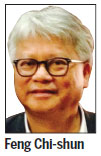People deserve to live and die with dignity
Updated: 2014-09-26 08:20
By Feng Chi-shun(HK Edition)
|
|||||||||

Not everyone enjoys good health in old age, and then dies in their sleep.
Most of us suffer from disease until we die from the end stages of these afflictions. Since we are all going to die, it makes sense to be well prepared for the inevitable, including what we want from our doctors in the final stages of our lives. We should make such decisions while we still can; otherwise, healthcare professionals and our relatives might do things contrary to our wishes.
It is such an important part of healthcare that US doctors are now being paid by insurance companies for talking to their patients about end-of-life issues, which include advance directives for all aspects of terminal care such as test-tube feeding, resuscitation in case of cardiac arrest, and other aggressive treatments bringing few benefits but a great deal of expense.
In the US, end-of-life planning has been much discussed and debated. This has evolved from its oldest form, commonly known as the living will, to a second generation advance directive such as durable power of attorney and healthcare proxy.
A third generation came into existence when they realized there were unforeseen deficiencies in the second generation advance directives because it was difficult to cover all possible scenarios and issues regarding the terminally ill.
Third generation advance directives are fine-tuned combinations of all previous generations and the documents are named Five Wishes and MyDirectives.
Many other Western countries have similar documents carrying names such as "advance health care directives", "personal directives", "advance decisions", or simply "living will"- these are invariably less sophisticated than their US equivalents.
Notably in the Netherlands where euthanasia is legal, their document is called the Euthanasia Directive. In the US, such end-of-life planning documents have legal status; in most other countries, they don't have, although they are legally persuasive.
Hong Kong is not unaware of the importance of this aspect of patient care. Officials call it simply "Advance Directives" or AD. In response to the Law Reform Commission's 2006 recommendations, the Food & Health Bureau (FHB) published a consultation paper on AD in 2009. Feedback on the concept was mostly favorable; however the realization was that the devil was in the legal details.
When the Medical Council was consulted, it balked at making a definitive decision; it instead recommended "a legal framework to protect all parties concerned", especially healthcare professionals.
Meanwhile, the Hospital Authority (HA) has formulated guidelines for addressing the issues faced by terminally ill patients. It has designed a standard form for AD purposes. This tries to address all the possible issues in the eventuality of coma, vegetative state, and senility. Their experience in AD has so far been limited. This is because of low levels of participation from both patients and doctors, which is understandable. When grandma is in ICU, visiting relatives are more likely to say "Get well soon!" than they are to ask her face to face - "Do you want to be resuscitated if you stop breathing?"
Given that for most Hong Kong citizens, death and terminal illness are taboo subjects, the FHB believed it was not the right time to implement AD through legislation.
I am not holding my breath waiting for the government to act for me; I am taking matters into my own hands. I have downloaded the HA's standard form and filled in all my dying wishes. All my children and my wife have a copy.
I have even gone a step further.
Of all the disabilities associated with aging, the one I dread most is senile dementia, most commonly caused by Alzheimer's disease. I believe it is possibly the most malicious malady afflicting humanity. With it, you lose everything - your dignity, intellect, free will, capacity to have fun, and physical independence. You impose insurmountable hardships on devoted members of your family. More often than not, though, there is nobody sufficiently devoted to care for you long term, and eventually you are abused and humiliated, cheated out of your money and other personal belongings, neglected, and left to die a slow death.
I do not believe life with Alzheimer's to be worth living, by ending it, you are doing everyone a favor, including yourself. In addition to my AD, I have granted my family the power of attorney to carry out euthanasia on me in the Netherlands if I become terminally senile.
The author was a consultant pathologist for the Hong Kong government and St. Paul's Hospital before his recent retirement.
(HK Edition 09/26/2014 page10)